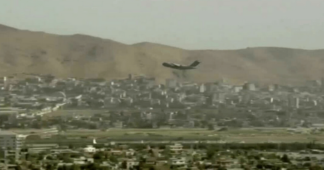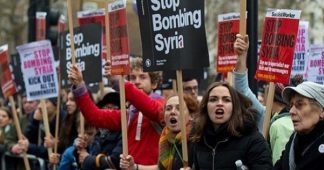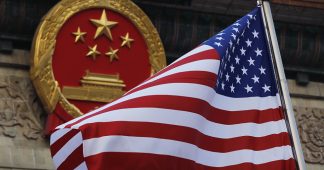Values-driven’ foreign policy is simultaneously a domestic culture war. On both fronts, Western values-talk is past its sell-by date.
Phil Hammond is Emeritus Professor for Media & Communications at at London South Bank University
This article is cross-posted from The Northern Star
Jul 23, 2022
‘The fact of their courage … should give us courage; their determination should lend us strength; their embrace of democratic values … should reinforce our own confidence in those values’. It sounds so familiar. Was it Joe Biden urging his fellow Americans to ‘draw inspiration from the iron will of the Ukrainian people’? Or maybe European Parliament president Roberta Metsola exalting ‘a population that is fighting for our values’? Or was it Ursula von der Leyen explaining how ‘Ukrainians are ready to die for the European perspective’?
All perfectly plausible, but in fact those words were spoken by Tony Blair in 2006, praising the efforts of Afghans and Iraqis to rebuild their countries after devastating Western military interventions. Western leaders (or their speechwriters) clearly think that affirming their values by discovering other people fighting for them elsewhere is some kind of brilliant rhetorical ploy. Increasingly, however, it comes across as delusional vanity; like a person preening at their own beauty while pointing at a portrait of someone else.
This narcissism might be merely comical if it were not for the fact that it drives an intrusive and aggressive foreign policy. One of the earliest and most explicit examples was Bosnia, where, as Michael Ignatieff later admitted, he and other advocates of Western intervention were chasing a ‘narcissistic image of ourselves’: ‘We intervened not only to save others, but to save ourselves, or rather an image of ourselves as defenders of universal decencies. We wanted to know that the West “meant” something’. Such moments of self-reflection rarely produce any lasting insight, however — the year after publishing these words, Ignatieff was agitating in favour of NATO’s ‘war for values’ in Kosovo.
Since the end of the Cold War, Western elites have repeatedly sought meaning and purpose in foreign intervention. Former president Ronald Regan explained the approach in a December 1992 speech — delivered on the same day that his successor and former vice president, George Bush Snr., was putting it into practice by dispatching thousands of US troops in a ‘humanitarian invasion’ of Somalia. Acknowledging that the fall of the Soviet Union had ‘robbed much of the West of its uplifting, common purpose’, Reagan outlined a new ‘cause’ for people to rally round. ‘What I propose is a humanitarian velvet glove backed by a steel fist of military force’, he said; ‘the world’s democracies must enforce stricter humanitarian standards of international conduct’.
The ‘rules-based’ order that emerged after the Cold War has always been justified and promoted as altruistic. The ethics of ‘ethical foreign policy’ are other-directed, claiming a ‘right of humanitarian intervention’ or shouldering a ‘responsibility to protect’ in order to help others. Yet today’s supposedly humanitarian ideology of vulnerability is deeply misanthropic, dividing the world into victims in need of pity and protection, and victimisers needing to be policed and punished.
A similar outlook has prevailed in domestic Western politics, where a technocratic ruling elite has spent decades devising ever more invasive ways to control their citizens, lecturing people about their ‘unhealthy’ lifestyles, policing their ‘anti-social behaviour’, measuring their ‘carbon footprints’, training them to use ‘appropriate’ language. The message, delivered relentlessly, is that we are at risk from each other, all victims-in-waiting or potential abusers.
The elite’s fear and loathing was bad enough in the end-of-history interregnum, when the legitimacy of their rule was called into question by mass withdrawal from politics and all the talk was of democratic deficits, ‘ruling the void’, and ‘post-democracy’. Since the populist upsets of the last few years, though, the rhetoric has become more strident. Voters are openly despised as deluded ‘deplorables’, as gullible ‘gammon’. The hectoring about behaviour and attitudes has become as ludicrous as it is shrill, with major controversies about whether men can get pregnant, what pronouns to use, or whether statues encourage racism.
Internationally, the West apparently wants to act as woke diversity trainers to the world. The US government sponsors discussions on ‘decolonising Russia’, while congressmen call for the protection of ‘members of the LGBTQI+ communities’ in Ukraine, and the British Prime Minister blames the war on president Vladimir Putin’s ‘toxic masculinity’. This sort of thing is catnip to the laptop class, of course. Academics and journalists have missed no opportunity to denounce ‘macho’ Putin and his ‘anti-gay war on Ukraine’, or to celebrate ‘Ukraine’s “unicorn” LGBTQ soldiers’ who are ‘transforming the LGBTQ+ rights landscape in Europe’ by fighting against Russian’s unenlightened ‘darkness’.
Outside of the professional middle classes, though, woke foreign policy surely seems rather puzzling. The ever-changing etiquettes of identity politics can hardly be said to be popular even in Western societies. Projecting the West’s divisive culture wars internationally looks at first glance like a dubious strategy: Anglo-American Pride-flag diplomacy has predictably drawn consternation from allies in the Middle East, for example. But lack of popularity does not matter. The divisiveness is not a bug, it’s a feature.
Both at home and abroad, culture-wars politics entails drawing a division between the enlightened, morally-superior minority attuned to the exclusions and oppressions of the vulnerable, and the uninformed, unaware majority who are likely to abuse if they are not re-educated and policed. Since it has not been subject to systematic challenge, that position of moral superiority has looked secure for a long time. As historian James Heartfield observes in his 2017 study, The Equal Opportunities Revolution, in Britain the groundwork was laid in the 1980s, when ‘top-down anti-discrimination measures’ proliferated as ‘instruments of labour discipline, in the hands of the employers and the authorities, to dominate employees’. Although such workplace policies continue to be presented as empowering excluded or disadvantaged identity groups, the people actually empowered are managers and human-resources administrators. ‘Even where these acts of domination are in favour of minorities’, Heartfield notes, ‘they enhance the power of the elite over the mass’.
By the turn of the millennium, the intertwining of such diversity politics with military and foreign policy was well underway. In the early 2000s, scholars were already remarking on proposals for a change in military culture ‘from a masculinist vision of unalloyed aggressivity to an ungendered vision’, and critiquing the ways that a ‘new homonormativity’ served the ‘political agendas of US imperialism’. Twenty years ago, articles in the US Army’s Parameters journal registered the military’s unease with such developments. Yet the trends identified then have not only escalated, they are now seen as cause for celebration. One of USA Today’s 2022 Women of the Year, for example, was Admiral Rachel Levine, America’s first transgender four-star officer. Even the CIA now promotes itself on the basis of its embrace of intersectionality — in one advert, for instance, a Latina CIA officer intones: ‘I am a woman of colour. I am a mom. I am a cisgender millennial who’s been diagnosed with generalized anxiety disorder. I am intersectional’.
Though there are long-term trends at play, however, ‘intersectional imperialism’ has been ramped up dramatically under the Biden administration because it combines the established victim-directed ethics of post-Cold War foreign policy with the domestic culture war against populism. Hence when they explain their global policy framework of ‘democracy vs. authoritarianism’ US leaders frequently emphasise that this is an agenda for American politics as much as international relations.
So, for example, when Biden’s December 2021 ‘Summit for Democracy’ pledged to ‘promote the human rights of activists, women and girls, youth, LGBTQI+ persons, persons with disabilities, and marginalized populations’, this was coupled with ‘efforts to combat disinformation’ and ‘strengthen electoral integrity’ as part of a ‘commitment to strengthening democracy at home’ as well as ‘supporting democracies and human rights worldwide’. Similarly, when Secretary of State Anthony Blinken set out the government’s foreign-policy priorities in a cable to US embassies around the world, he noted that America also faced ‘challenges’ from ‘populist and authoritarian forces’, including ‘political polarization, disinformation and misinformation, and low levels of trust in government’. The target is not just authoritarian regimes but so-called ‘authoritarian populism’.
It is the frequent semi-coded references to ‘disinformation’ that give the game away. Western elites, particularly in Britain and the US, have been in the grip of what Thomas Frank calls a ‘Democracy Scare’ since 2016, openly sneering at the ‘low-information voters’ who backed Trump or Brexit. According to one commentator, the rise of populism was really the ‘rise of the incompetent citizen’, since the ‘structural weakness’ of liberal democracies is ‘a citizenry that lacks the cognitive and emotional capacities to think, feel and act in ways required’. The ‘central problem with democracy’, agreed another, is that ‘voters nearly always lack the necessary knowledge. They are not just ignorant; they are usually misinformed. Democracy is the will of the people, but the people usually have little clue what they are doing’. The obvious conclusion, said a third, was to ‘trust elites a little more and the masses a little less’, since ‘We’d likely be better off if we kept the voters … a little further away from the levers of power’. Or as yet another commentator bluntly put it in Foreign Policy magazine, ‘It’s time for the elites to rise up against the ignorant masses’. This is what they mean by ‘strengthening democracy’ at home: finding ways to contain and control electorates who have the wrong opinions and vote the wrong way.
In the international arena, Western democracy promotion is if anything even less credible. ‘Democratisation’ has nothing to do with genuine self-determination. It is something the West does to weaker countries — by cultivating NGOs and ‘civil society’ leaders with the right ideas; by intervening in countries’ internal politics to promote Western-friendly regimes integrated into supranational economic, political and military institutions; and, if necessary, by force.
Ukraine, now said to the ‘front line’ in the war for democracy, is a textbook case. By the end of 2013, the US had spent over $5 billion helping Ukraine to ‘build democratic skills and institutions [and to] promote civic participation and good governance’, according to Assistant Secretary of State Victoria Nuland. The US then orchestrated a coup to overthrow the elected government because it had failed to stick to a pro-EU, pro-NATO policy. Nuland was famously caught on tape deciding who should take over in a new government. By the end of 2014, as Diana Johnstone notes, ‘the government of “democratic Ukraine” was largely in the hands of US-approved foreigners’. The US then spent billions on military assistance to Ukraine while the Ukrainian government attacked its own citizens in the Donbas. Western interference has put Ukraine on the front line of a war, but not for democracy.Western values-talk rings hollow. Just as populist revolts at home have demonstrated a willingness to reject liberal elites, so there are signs that the world is less willing to follow Western leadership. Outside of Europe and North America, just seven states have so far joined the sanctions against Russia. The choices may be limited. The alternatives may be flawed. But people are increasingly looking for one
Published at braveneweurope.com
We remind our readers that publication of articles on our site does not mean that we agree with what is written. Our policy is to publish anything which we consider of interest, so as to assist our readers in forming their opinions. Sometimes we even publish articles with which we totally disagree, since we believe it is important for our readers to be informed on as wide a spectrum of views as possible.










